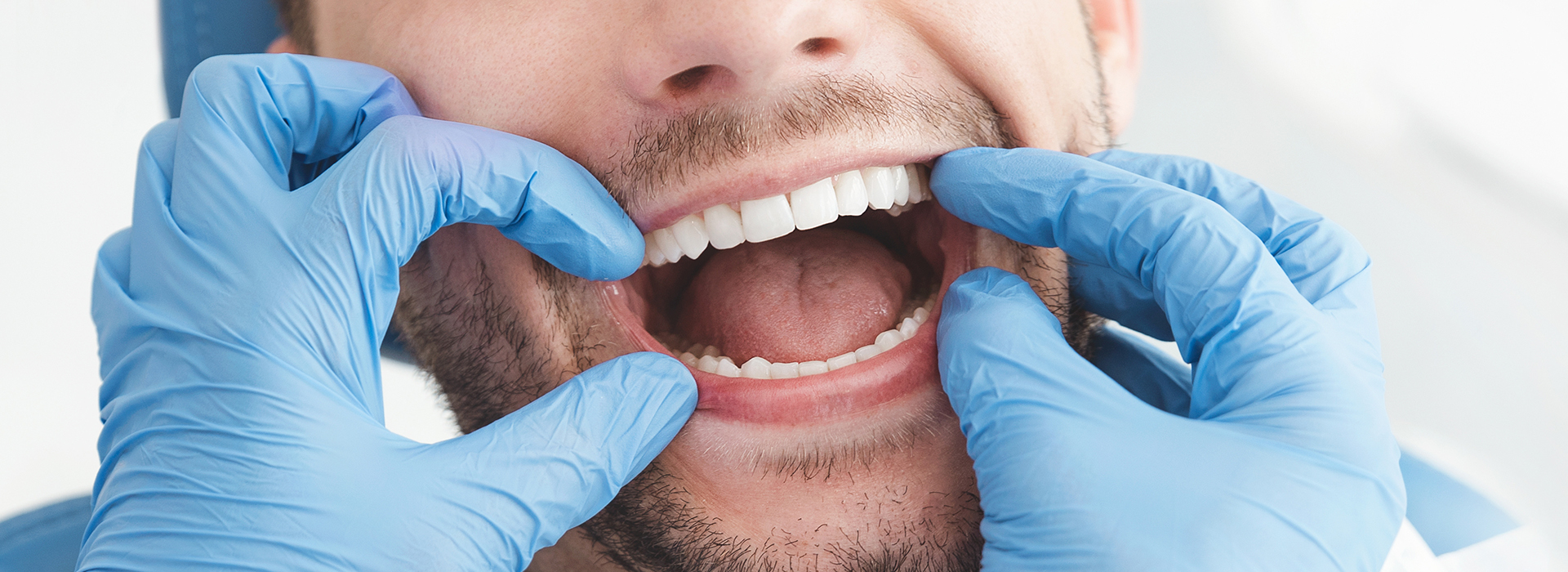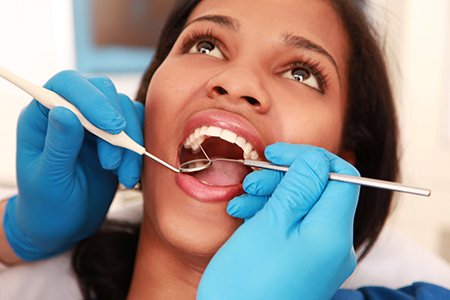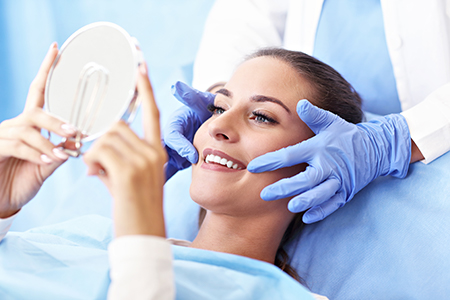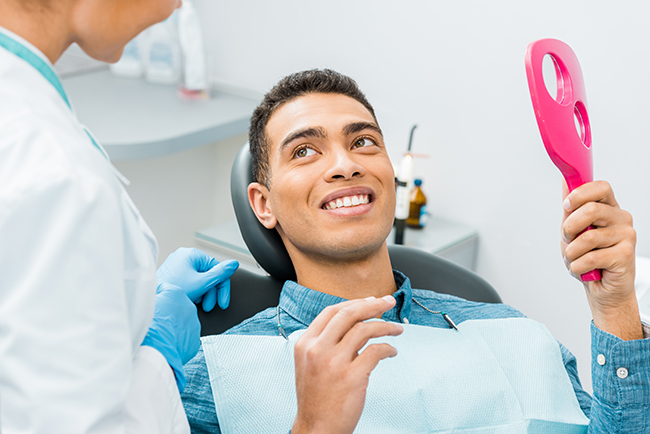
At the office of Cosmetic Micro Dentistry, we take a prevention-first approach to care because the best outcomes begin before symptoms appear. Regular oral exams are a chance to preserve healthy teeth and gums, identify early changes, and tailor care to each patient's lifestyle and medical history. Our goal is to combine meticulous clinical observation with modern diagnostics so you leave informed and confident about your oral health.
Your first comprehensive appointment sets the foundation for all future care. We begin with a careful review of your medical and dental history to understand medications, past treatments, and any conditions that could affect oral health. Listening to your concerns—whether sensitivity, jaw discomfort, or aesthetic goals—helps us prioritize what matters most to you.
The clinical portion of the exam examines every element that supports a healthy smile: teeth, gums, bone, tongue, and the tissues of the mouth and throat. We evaluate bite alignment, check for wear patterns that suggest clenching or grinding, and assess the function of the temporomandibular joint (TMJ). When indicated, we use targeted diagnostic images to reveal issues that aren’t visible to the naked eye.
Oral cancer screening and a periodontal assessment are routine parts of a complete exam. These screenings are quick, noninvasive, and essential for catching conditions early when treatment is most effective. At the end of the visit, we’ll review findings with you, suggest any necessary follow-up, and outline options in straightforward terms so you can make informed choices.

The mouth is a window to the rest of the body. During an oral exam we look for signs that dental problems may be linked to or signal systemic conditions. Inflammation in the gums, persistent infections, and certain oral lesions can influence overall health and may warrant a conversation with your medical provider.
Research increasingly shows connections between oral disease and broader health concerns. Maintaining periodontal health, for example, reduces chronic inflammation that can affect other organ systems. Our exams aim to detect changes early so you can address risk factors before they progress into more significant problems.
At each visit we also consider how medications, nutrition, and lifestyle habits are influencing your oral tissues. Symptoms such as persistent dry mouth, unexplained bleeding, or mucosal changes can be important clues. When findings suggest further evaluation, we’ll explain the implications clearly and recommend appropriate next steps.
Recognizing these links helps patients approach oral care as part of overall wellness—preventive exams are therefore as important for supporting systemic health as they are for protecting the smile.
Even the most diligent home hygiene routine can leave plaque and calculus in hard-to-reach places. Professional cleanings remove build-up above and below the gum line, reducing the bacteria that contribute to cavities and periodontal disease. A polished, refreshed mouth is often the immediate result, and the long-term benefit is lower risk of future problems.
We encourage routine exams and cleanings at intervals based on each patient’s risk profile—many people benefit from twice-yearly visits, while others may need more frequent monitoring. These visits allow us to track changes over time and intervene early when treatment is simpler and more conservative.
Preventive visits are also an opportunity for education. Our hygienists and clinicians demonstrate effective brushing and interdental cleaning techniques, advise on products that match your needs, and discuss dietary habits that support oral health. For children, these visits establish positive routines and allow us to monitor growth and development, so we can identify when orthodontic evaluation may be appropriate.
Our team strives to make every appointment efficient and informative, helping families build lifelong habits that protect both dental function and appearance.

Visual inspection is essential, but imaging reveals what lies beneath enamel and soft tissues. Digital radiography and three-dimensional imaging give us a detailed picture of tooth roots, bone levels, developing teeth, and anatomical structures that affect treatment planning. These tools make diagnosis more accurate and less invasive.
Digital x-rays use lower radiation doses than conventional film and deliver images instantly. That speed allows us to review results with you during the same appointment, explain findings on-screen, and incorporate images into a personalized treatment plan when needed. The clarity of digital images also helps when coordinating care with specialists or documenting changes over time.
In selected cases, cone-beam computed tomography (CBCT) provides three-dimensional views that are invaluable for implant planning, evaluation of complex anatomy, and assessment of impacted or ankylosed teeth. We recommend advanced imaging only when it will directly affect diagnosis or treatment outcomes.
Faster image capture with reduced radiation exposure
Immediate availability of images for patient review and diagnosis
Easier sharing and documentation for coordinated care
No film processing—environmentally safer and more efficient
Images are stored securely in the patient record for long-term tracking

Different imaging techniques serve different diagnostic needs. Small, focused films are useful for evaluating individual teeth and root tips, while panoramic images provide a broad overview of the jaws and developing dentition. Selecting the right image depends on the clinical question we’re trying to answer.
Common imaging types include periapical views for root and bone assessment, bitewing films for detecting interproximal decay, full-mouth series for a complete baseline, and panoramic radiographs for a wide survey of dental and jaw structures. Each type helps us detect problems at an early stage when they’re simpler to treat.
When complex anatomy or surgical planning is involved, three-dimensional CBCT imaging can provide cross-sectional views that improve precision and safety. We balance the benefits of each modality against the patient’s needs and recommend the least invasive option that still delivers the necessary diagnostic detail.
By combining careful clinical examination with appropriate imaging, we create a diagnostic picture that guides conservative, effective treatment and helps preserve long-term oral health.
In summary, thorough oral exams are the cornerstone of preventive dentistry. They allow us to find small problems before they grow, connect oral findings to overall health, and craft personalized care plans that respect each patient’s needs. If you’d like to learn more about our approach to oral exams or to schedule a visit, please contact us for more information.
Yes. We always welcome new patients and their families for care. Feel free to give us a call or reach out to us online to schedule a first visit or for any additional information on our office. We look forward to hearing from you!
Routine dental checkups and professional cleanings help ensure your smile remains in tip-top condition and that any developing problems receive the prompt care they require. While it's a good idea to schedule a checkup and cleaning twice a year, longer or shorter intervals between routine visits depend on your specific needs.
We understand that life gets complicated and busy, and for various reasons, you haven't been able to get to the dentist for care. Don't worry; it's always a good time to get back in touch with the health of your smile.
At Cosmetic Micro Dentistry, we offer skilled and compassionate care to address a wide range of dental needs. Whether you need a simple checkup and cleaning, restorations, periodontal treatment, root canal therapy, or the replacement of missing teeth to get your smile back into shape, we provide precise, gentle, stress-free treatment to give you a smile that is as beautiful as it is healthy.
Give us a call today; we're happy to address all your questions and concerns about getting your smile back in tip-top condition.
For pregnant women, practicing good oral care and seeing the dentist to maintain a healthy smile is considered an important component of prenatal care. Researchers have found that pregnancy not only increases the risk of oral health problems, but these problems may also lead to pregnancy complications. At the office of Cosmetic Micro Dentistry, we provide the skilled and compassionate care required to help expectant mothers keep their teeth and gums in tip-top condition. While certain procedures are not recommended during pregnancy, we provide the necessary care and take all the necessary precautions required.
Thanks to advances in modern dentistry, teeth that have been affected by a range of imperfections or that have sustained damage from trauma or dental decay can be restored to produce a naturally beautiful looking and functional smile.
As skilled and experienced providers of care, our office can effectively improve and enhance the appearance of teeth that are stained, discolored, misshapen, chipped, fractured, gapped, crowded, or broken down due to dental decay. At the office of Cosmetic Micro Dentistry, we offer a comprehensive selection of the leading-edge cosmetic solutions from teeth whitening procedures, dental bonding, tooth-colored fillings, and veneers, to prosthetic solutions and dental implants to rebuild complete and beautiful smiles.
Contact our office to learn more about the many ways we can help you create the smile you've always wanted.
If you're visiting Cosmetic Micro Dentistry for the first time, it is helpful that you contact your former dental office and have your records sent over to us. Make note of any problems you may have so that you can discuss them with your dentist.
To provide efficient service, we ask you to please bring your insurance card, an ID, plus any referral slips or diagnostic records given to you by another office. If you are taking medications, please note or make a list of what they are as you will need to provide that information.
Yes! We assure you that both you and your family will be in good hands at the office of Cosmetic Micro Dentistry.
We do our best to make sure every patient who steps into our office for care is put at ease. We provide precise and gentle care and our skilled, compassionate team strives to make every visit stress-free. You can rest assured that your smile is in the best of hands and that we are doing all we can to ensure your comfort throughout every procedure. While we always take the time to explain every step in care, feel free to ask us any questions about local anesthesia and methods of dental sedation.
At the office of Cosmetic Micro Dentistry, we strive to provide the highest quality of care to address all your dental needs. Once we've had the opportunity to examine your smile, we can give you a clear picture of any dental issues that are present, along with a quote for what the cost of treatment will be. The cost of care all depends upon the extent and complexity of issues affecting the health or appearance of your smile and the types of procedures that are required. Our goal is to make dental care more affordable so that you can begin treatment without any additional stress or delay.
Keep in mind that with routine dental checkups and periodic care, we can help prevent dental disease while treating emerging problems early in their onset to avoid larger issues and more expensive care down the road.
Routine dental checkups and preventive care procedures may be covered under your dental insurance plan requiring little to no out-of-pocket expense. We invite you to check our financial information page or give us a call to find out if our office participates with your plan, and if you have any other questions about dental insurance, dental savings plans, forms of payment, or financing options. We welcome your inquiries and do our best to help you begin care without additional stress or delay.
If you've lost a tooth due to injury, decay, gum disease, or any other reason, we recommend dental implants to replace missing teeth. Dental implants come the closest to replicating the look, feel, and function of your natural teeth.
Absolutely! Both flossing and brushing regularly are equally important to maintain your oral health. While brushing cleans the surface of your teeth, flossing cleans in between them. Flossing is important to prevent plaque buildup, which can cause gums to recede and lead to periodontal disease.
Even if you have dentures, it is still necessary to see a dentist! Dental checkups help ensure that your dentures are comfortable, fitting properly, and that there are no other problems. Beyond assessing your dentures, our dentist will also perform a thorough examination of the jawbone, and surrounding soft tissues both inside the mouth, the face, and neck, to confirm that you remain in good oral health.
Emergency dental care is a service we hope you'll never need- but if you do, the office of Cosmetic Micro Dentistry is here for you!
Whether you're suffering from a chipped tooth, toothache, or any problem affecting your oral health, you can be sure to get the prompt attention and compassionate care you require at our office. Patient care and comfort are our top priorities, and we offer a comprehensive range of the most advanced services to address a broad spectrum of dental needs.
While the pain of a toothache is one of the more common reasons that patients come to our office for emergency dental care, we also promptly treat emergencies that are not necessarily painful like crowns that have been dislodged and broken dentures that leave embarrassing gaps in one's smile.
You can rest assured that your oral health is in the best of hands at our office. We'll quickly determine exactly what's wrong, explain your treatment options, and then provide the precise and gentle care you require to alleviate your discomfort and get you back on the path to oral health and wellness.
Your health and comfort are our top priorities. If your dental emergency is painful, if it affects the appearance of your smile, or if you suspect that an infection is present, our office will make every effort to see you as soon as possible for care.
At the office of Cosmetic Micro Dentistry, we welcome patients of all ages for care and offer a comprehensive range of services designed to help every member of your family maintain a beautiful and healthy smile. Whether you or a loved one needs a routine checkup and cleaning, fillings, same-day crowns, a cosmetic smile makeover, the replacement of missing teeth or require the services of a skilled and compassionate emergency dentist, you can rely on our office for the highest quality care.
For more information on our office and the many services we provide, or to schedule an appointment for care, give us a call today.
A comprehensive oral exam is a systematic evaluation of your teeth, gums, jaw joints and surrounding soft tissues to establish a dental baseline. The visit typically includes a review of your medical and dental history, a visual and tactile inspection of the oral cavity, assessment of periodontal health, occlusion and TMJ function, and an oral cancer screening. The clinician will note any signs of decay, wear, infection or other abnormalities and document findings for future comparison.
Diagnostic images or films are often recommended to view structures beneath the surface, and any necessary measurements or tests will be recorded. Based on exam findings, the clinician will discuss recommended next steps, prioritize care and outline preventive strategies to help you maintain or improve oral health. Patient education and a tailored home-care plan are integral parts of the visit to support long-term outcomes.
Prepare for your first visit by bringing a list of medications, recent medical history and any dental records you may have, along with a summary of specific concerns or symptoms you are experiencing. Arrive ready to discuss past dental treatments, allergies and any changes in your overall health, since these details inform diagnosis and treatment planning. If you wear dental appliances or removable prosthetics, bring them to the appointment so the clinician can assess fit and function.
At the office of Cosmetic Micro Dentistry, our team will take time to review your history, complete a thorough exam and explain any recommended diagnostics in clear, patient-friendly language. We encourage you to ask questions about what we find and to let us know about any anxiety or comfort needs so we can tailor the appointment experience. By sharing this information up front, you help us deliver safer, more effective care from the very first visit.
For most patients, routine oral exams and professional cleanings are recommended twice a year to monitor oral health and to catch problems early when they are easiest to treat. The standard six-month interval supports early detection of decay, gum disease and changes in oral tissues, and it allows your dental team to reinforce preventive habits. That schedule also creates a baseline that makes it easier to identify subtle changes between visits.
Some patients require more frequent monitoring based on risk factors such as active periodontal disease, a history of frequent cavities, medical conditions or certain medications that affect oral health. In those cases, your clinician may recommend appointments every three to four months or another interval tailored to your needs. The goal is to find a balance that minimizes risk and keeps your smile healthy long term.
Yes. An oral cancer screening is a routine component of a comprehensive oral exam and involves a careful inspection and palpation of the mouth, throat, lips, tongue and neck for any unusual lumps, sores, discolorations or textures. The clinician looks for changes in tissue appearance and checks for areas that do not heal or that feel different from surrounding tissue. Screening is quick, noninvasive and can be lifesaving by identifying suspicious findings early.
Patients with risk factors such as tobacco use, heavy alcohol consumption, a history of sun exposure to the lips or human papillomavirus (HPV) infection may need more vigilant monitoring. If the clinician identifies an area of concern, they will document findings, take images or recommend a biopsy or referral to a specialist for definitive diagnosis. Early detection significantly improves treatment options and outcomes.
Dental x-rays are a key diagnostic tool that reveal conditions not visible during a visual exam, such as decay between teeth, bone loss from periodontal disease, impacted teeth and infections at the root tips. Different types of images serve different purposes: bitewings for detecting interproximal decay, periapicals for individual tooth assessment, panoramic films for broad jaw overview and CBCT scans for three-dimensional analysis when indicated. Imaging complements the clinical exam and helps the team make informed treatment decisions.
Modern digital radiography reduces radiation exposure and enables immediate image review, storage and secure sharing when coordination with other providers is necessary. Your clinician will recommend only the images needed for safe, accurate diagnosis and will explain the rationale for any radiographs proposed during your visit. Imaging frequency is guided by your clinical needs, age, risk factors and the presence of symptoms.
Oral exams can reveal manifestations of systemic conditions because many diseases produce signs in the mouth before or alongside symptoms elsewhere in the body. Findings such as persistent dry mouth, unusual oral ulcerations, swollen or bleeding gums, and changes in tongue or mucosal color can be associated with conditions like diabetes, nutritional deficiencies, autoimmune disorders and certain infections. Careful documentation and pattern recognition during routine exams help clinicians identify when further medical evaluation is warranted.
When a clinician suspects a systemic link, they will discuss the observations with the patient and, when appropriate, recommend collaboration with the patient’s physician or a medical specialist. This interdisciplinary communication supports timely diagnosis and coordinated care while ensuring oral findings are managed in the context of overall health. Regular dental visits therefore contribute to broader health surveillance beyond the teeth and gums.
Pediatric oral exams focus on growth, development and prevention, evaluating tooth eruption, jaw alignment, oral habits and early signs of decay or enamel defects. The clinician will assess how a child bites and chews, check for tongue or lip ties if present, and look for risk factors such as prolonged pacifier use or thumb-sucking that can affect development. Age-appropriate education for parents and children about brushing, flossing and dietary habits is an important part of the visit.
Preventive measures such as fluoride varnish, topical fluoride recommendations and sealants for vulnerable molars may be discussed based on the child’s risk profile. The clinician will also monitor jaw and dental development over time to determine whether early orthodontic assessment is advisable. Creating a positive, low-stress environment helps children build trust and fosters lifelong oral health habits.
Oral exams guide individualized prevention by identifying areas of plaque and tartar buildup, early decay, gum inflammation and habits that compromise oral health, allowing the care team to recommend targeted interventions. Hygienists and clinicians use exam findings to demonstrate effective brushing and flossing techniques, discuss flossing aids or water irrigation, and tailor home-care regimens to the patient’s specific needs. The exam also helps determine whether adjunctive therapies such as fluoride treatments or antimicrobial measures are appropriate.
Education during the exam empowers patients to take an active role in their oral health and reduces the likelihood of disease progression between visits. Regular exams also provide opportunities to review lifestyle factors—such as diet, tobacco use and medication effects—that influence oral health. When patients understand the reasons behind recommended practices, adherence improves and preventive outcomes are stronger.
Most oral exams are comfortable and noninvasive, consisting of visual inspection, gentle probing and routine measurements performed by trained clinicians. Any brief discomfort is typically minimal, and procedures that cause pain—such as treating active decay or performing surgical interventions—are managed with appropriate anesthesia or comfort measures. If you experience dental anxiety, discussing your concerns ahead of time allows the care team to offer strategies that improve comfort during the visit.
For patients who require extra support, options such as nitrous oxide for minimal sedation or other comfort-focused techniques may be available depending on the procedure and individual needs. The clinician and staff will explain what to expect and obtain your consent before performing any diagnostic or treatment steps. Prioritizing communication and gentle technique helps make the exam a positive experience for most patients.
Advanced technology enhances diagnostic clarity and precision by providing detailed images and magnified views that complement the clinical exam, enabling earlier detection of small lesions, cracks or bone changes that might be missed by the naked eye. Digital radiography, intraoral cameras and CBCT imaging allow the team to review findings in real time, document baseline conditions and explain issues visually so patients better understand their oral health. These tools support more predictable treatment planning and reduce guesswork.
At the office of Cosmetic Micro Dentistry, technology is combined with clinical expertise to deliver thorough exams and tailored recommendations while prioritizing patient comfort. Digital workflows streamline recordkeeping and interdisciplinary communication when coordination with other providers is needed, and they support efficient, minimally invasive care. The result is a more accurate, transparent and patient-centered approach to oral health management.
Quick Links
Contact Us